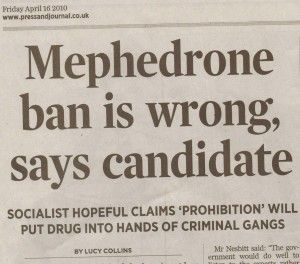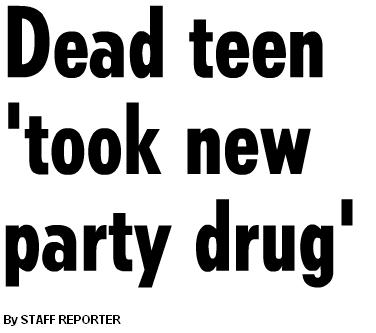Posts Tagged “mephedrone”
 One possible candidate for the new ACMD As previously reported by SSY, the government isn’t generally too keen on scientific advice when it comes to formulating drug policy. When the Advisory Council on the Misuse of Drugs, and independent body advising the government on drugs legislation, recommended against Cannabis being reclassified as a class B drug, the Labour government went ahead and done it anyway. When the same body said that Ecstasy, a class A drug, should be downgraded, they ignored that advice too. The former chair of the ACMD and SSY hero Professor David Nutt was even sacked after a pamphlet he produced said that alcohol and tobacco were more harmful than cannabis, LSD and Ecstasy. Now we have a new government, and they’ve finally come up with a solution to the fact that none of their drug policies agree with the scientific evidence – get rid of the scientists all together!
That’s right – if a proposed amendment to the Misuse of Drugs law passes, it will remove the requirement for scientists to be included in the committee. After years of ignoring all the evidence when it comes to drugs anyway, this policy looks like it could be signed into law. It’s a well known fact that policy on drugs is driven by the tabloid newspapers more than what is useful – this year’s mephedrone ban was brought in after a series of deaths reported in the media attributed to the drug. The most famous of these cases, the deaths of Louis Wainwright and Nicholas Smith, put huge pressure on the government to ban the drug – it was later discovered that they had not been taking mephedrone at all. By removing the need for scientists on the ACMD, the government is making an admission that they don’t care about science when they make decisions that criminalise thousands of people – only about pandering to the media lies and propaganda about drugs.
As SSY has always argued, legalisation and regulation, based on scientific evidence of harms, is the only sensible drug policy. Drugs would be purer and safer, production would be taken out of the hands of criminal gangs, and people could be given information about each drug’s harm that isn’t based on scare stories. Removing scientists from the ACMD further reduces its importance and relevance, and means the government can carry on doing whatever it likes about drugs without scrutiny from people who actually know what they are talking about. Whilst not all the scientists on the ACMD support legalisation, they support an evidence-based drugs policy – something that it’s obvious the government couldn’t care less about.
 8 Comments »
8 Comments »
 Monday morning's headlines after SSY's legalise cannabis march Every human society since we first evolved has experimented with drugs, pyschoactive substances, and altered states of consciousness.
Many leading psychologists and anthropologists believe that this is a normal part of human life, and experimenting with substances like cannabis or magic mushrooms has actually played a role in the evolution of modern, intelligent humans.
But in the last 200 years human society has changed dramatically. With the arrival of capitalism came the rise of modern states, with their borders, armies and police forces. As the technology to control their own people developed, states have had an ever increasing urge to monitor and discipline their populations.
One of the ways they have done this is implement a worldwide system of prohibition of drugs. While the two biggest drug killers, alcohol and tobacco, remain legal billion pound industries, relatively harmless drugs like cannabis and ecstasy remain the target of expensive police operations, and users are turned into criminals who can face imprisonment for doing nothing but experimenting with their own bodies.
The drugs laws we have in Britain and throughout the developed world have never borne any relation to real medical or scientific information, but instead have been shaped by the prejudices and scapegoats created by elites to divide and control the people. One of the main ways they have done this is to use racism, associating certain substances with foreigners or ethnic minorities.
Now, in the 21st century, many countries around the world are finally beginning to wake up to the fact that prohibition has been a costly disaster that has caused untold misery across the planet. The time has at last come to begin treating drugs as a health and social issue, not a criminal one, and base our drugs policies on real scientific evidence, not prejudice and racism.
Read the rest of this entry »
 1 Comment »
1 Comment »
Back in April the Daily Mail asked us: “Meow Meow: Is Carmen, 17, the latest victim?”
Shock answer: no.
 Carmen Marie Moulton Carmen Marie Moulton from Penrith died in April just after the government imposed a ban on mephedrone, due to media scare stories with no scientific basis. These stories, as we all now know, revolved around picking up on the death of virtually any young person around the country and pinning the blame on mephedrone. Many of these false stories have now been exposed as bollocks, but long after the fact.
Papers said police were probing whether Carmen had taken the “deadly party drug”, but yet again toxicology reports have pronounced her’s a non-mephedrone related death. While there’s little news as of yet as to what did cause her tragic death, expect to see more and more of these so-called M-Cat casualties turning out to actually have died of other drugs or natural causes.
 1 Comment »
1 Comment »
 On the left Louis Wainwright and on the right Nicolas Smith The case for the mephedrone ban rushed in by the last government was again undermined today, after it was revealed two teenagers from Scunthorpe did NOT die as a result of the drug.
Louis Wainwright, 18, and Nicholas Smith, 19, died in March. At the time Humberside Police helped contribute to the climate of drugs panic by holding a press conference that claimed that they had information that “the deaths were linked to M-Cat” and that anyone that had taken the drug should “attend a hospital as a matter of urgency.”
This was then taken up by tabloids like The Sun as part of a hysterical campaign which successfully got mephedrone banned. As we argued at the time, this was based on straight up misinformation, which claimed that the drug had been responsible for scores of deaths.
In fact, Professor Roumen Sedefov, a leading scientist who monitors new drugs for the European Monitoring Centre for Drugs and Drug Addiction (EMCDDA), said this week he was aware of only one fatality in the world – that of a woman in Sweden – where the drug had been definitively identified as the cause of death.
In the case of the two guys from Scunthorpe, toxicology reports have revealed there were no traces of Mephedrone in their blood. Tests are ongoing to see if there were any other drugs present.
Professor David Nutt, the scientific adviser that Labour sacked for giving honest scientific opinions, has now called for an inquiry into the role of Humberside Police in stoking panic.
“The temperature was rising a bit, but the deaths got it boiling over,” he said. “You can argue if that hadn’t happened the previous government wouldn’t have been bounced into this response. If these reports are true, the government’s rush to ban mephedrone never had any serious scientific credibility – it looks much more like a decision based on a short-term electoral calculation.”
He added: “This news demonstrates why it’s so important to base drug classification on the evidence, not fear and why the police, media and politicians, should only make public pronouncements once the facts are clear.”
This news once again vindicates the stance taken by SSY as the only political group that stood by the scientific evidence and campaigned against the banning of Mephedrone. We didn’t do that because we think it’s a good thing or that people should take it, but because we’re against politics being hijacked by a bizarre media crusade that aimed at selling papers through fear and lies. After months of this thousands of young people who would never have heard of the drug otherwise are now interested in it – just in time for the government to put the trade exclusively in the hands of illegal drug dealers. Good job, corporate media/mainstream politicians.
 2 Comments »
2 Comments »
 Doctors: Frustrated with the government's pish The Lancet, one of the most respected medical journals, has used an editorial to slam the government’s ban on mephedrone.
Under the title ‘A collapse in the integrity of scientific advice in the UK,’ they write:
“There was little time to consider carefully the scientific evidence on mephedrone. The ACMD did not have sufficient evidence to judge the harms caused by this drug class. It is too easy and potentially counterproductive to ban each new substance that comes along rather than seek to understand more about young people’s motivations and how we can influence them. We should try to support healthy behaviours rather than simply punish people who breach our society’s norms. Making the drug illegal will also deter crucial research on this drug and other drug-related behaviour, and it will be far more difficult for people with problems to get help.
The terms of engagement between ministers and expert advisers endorsed by [Home Secretary] Alan Johnson have been blown apart . . . [T]he events surrounding the ACMD signal a disappointing finale to the government’s relationship with science. Politics has been allowed to contaminate scientific processes and the advice that underpins policy. The outcome of an independent enquiry into the practices of the ACMD, commissioned by the Home Office in October, 2009, is now urgently awaited. Lessons from this debacle need to be learned by a new incoming government.”
As well as the editorial, the Lancet features a special report on the ban, which has info from Sweden, where the government has already banned mephedrone:
“David Gustavsson, now at University Hospital of Malmö, Sweden, questions whether experimentation with unstudied substances, especially by inexperienced young people, is because of the misconception that legality implies safety. Adam Winstock [from the National Addiction Centre, London,] also points to the large market of users who are dissatisfied with illicit stimulants and interested in substances with a desired profile of effects, availability, and perceived value for money. Users and community workers suggest that the unavailability or low purity of cocaine and MDMA—related to international control measures—“have contributed to the increase in mephedrone use”, the ACMD cites. Additionally, cathinone derivatives are so-called legal highs and widely available from internet websites, sold as bath salts or plant food, not for human consumption.
Sweden is among several countries that have now banned or controlled mephedrone. Gustavsson recalls that mephedrone use was more frequently reported at Maria Ungdom [hospital, where he worked] from mid-2008, including several users who had encountered “unusual” difficulty stopping mephedrone compared with other drugs. By autumn, 2008, “mephedrone was by far the most popular legal drug sold on the internet in Sweden”, he recalls. Mephedrone was classified as hazardous in Sweden in December, 2008, which restricted internet sale. Subsequently, anecdotal evidence suggests that mephedrone began to be sold person-to-person rather than on the internet, he says.
Stefan Sparring, senior consultant at Maria Ungdom, describes what happened after mephedrone was classified as hazardous: “the drug quickly moved to the illicit trade in the streets, and we still saw new cases every week. In the spring of 2009 it was classed as a narcotic and after that we thought we could see a trend of it disappearing.” However, Sparring still sees new cases related to mepehdrone use every week. “What we now also see is the true emergence of ‘designer drugs”, he notes. After mephedrone became illegal, methodrone flooded the market, he says. Methodrone has since been implicated in two deaths and banned in Sweden. Now, says Sparring, “we have flephedrone instead, and it just continues”.
In other words, the ban in Sweden has not worked, and people are still taking mephedrone. But one of the most interesting things in the above quote is medical experts acknowledging that the interest in mephedrone has a lot to do with the inaccessibility of untainted MDMA or cocaine. Users aren’t interested in “legal highs” because of any inherent respect for the law, but because they know that the illegal, unregulated drugs market means you can’t know what you’re getting. Any attempt to work with drugs users to ensure they know exactly what they’re taking is ruled out by the prohibition policy. As Adam Winstock puts it:
 Sweden: Good with meatballs, drugs prohibition not so much “The lesson we need to learn is, in the case of such drugs, what is the impact of different interventions in harm and use?” he told The Lancet. When a drug is made illegal, controls are limited to supply reduction and keeping harm to a minimum . . . “While in no way does ‘legal’ confer relative safety, it does mean that a broader repertoire of responses is available”, they note.
The Lancet coverage just underlines the scientific bankruptcy of government policy. Drugs prohibition is like the emperor who wears no clothes. Scientists, doctors, drug workers and young people can all see it’s a failed idea and must be scrapped. But when it comes to the political arena, the only political party that can see through the tabloids’ lies and stand by actual scientific evidence is the Scottish Socialist Party.
 No Comments »
No Comments »
 Raising the issue outside Anderston police station, Glasgow Scottish Socialist Party General Election candidate for Glasgow Central, James Nesbitt, today spoke out against the banning of ‘legal high’ mephedrone, which came into effect today, Friday 16 April.
James, an unemployed 23 year old and resident of Govanhill, said: “Prohibition is a flawed approach. Experience has shown that criminalisation does not reduce harm. Leading scientists have spoken out against banning mephedrone, but they have been ignored by senior politicians.”
James pointed out: “Instead of listening to experts, the government has tried to browbeat them into propping up the failed criminalisation strategy. Policy is now being dictated by hysterical tabloid campaigns, rather than scientific evidence.”
“Banning m-cat will not reduce harm. Its production and distribution will now be in the hands of criminal gangs, who will benefit from the media-manufactured hype around the drug.”
Recommending a new approach, he comments: “A responsible strategy should begin with listening to the advice of drug experts: regulate recreational use so that safety is paramount. Focus should be placed on education, not criminalisation.”
“Professor David Nutt was sacked for speaking out against government posturing. A series of experts have also resigned over the rush to ban mephedrone, including Eric Carlin and Dr Polly Taylor. The government would do well to listen to the experts rather than be sucked in by hype and hysteria.”
“The war on drugs has failed. It is time for a new evidence-based approach designed to limit harm and take drug supply out of the hands of criminal gangs.”
 The SSP is standing 10 candidates across Scotland and is unique in being the only party to speak out against drug criminalisation and in favour of a social health based approach to drug use. The SSP is standing 10 candidates across Scotland and is unique in being the only party to speak out against drug criminalisation and in favour of a social health based approach to drug use.
The above story was picked up by The Press and Journal (left) and The Metro today, while The Scotsman also featured comment from James. No sign of a hysterical campaign from The Record yet anyway…
 No Comments »
No Comments »
 Just a warning, but don’t go anywhere near STV tonight. NICK CLEGG IS GOING TO BE ON IT. And Gordon Brown. And David Cameron.
The reason: they’re going to be ‘debating’ with each other, answering stage-managed questions from a strictly controlled studio audience (no clapping, no jeering, no facial expressions), in the first of three much hyped up ’leaders debates’. This evening, they will begin by discussing ‘domestic issues’ – stuff like crime, health, education and welfare, followed by a competition in which try to out-right each other on immigration. All bets are off! Not to mention that half the issues being debated tonight won’t even apply to Scotland, given that much of Scotland’s domestic decision-making is now devolved to the Scottish Parliament.
Over the three televised debates though, one thing is clear: while Brown, Cameron and Clegg will skirt around the edges of the big issues, argue about national insurance increases, numbers of helicopters and who’s the biggest BFFL with Obama, they’re going to completely avoid discussing two of the biggest issues facing the country at this election: the massive public sector spending cuts that are heading our way, and the ongoing bloodshed and occupation in Afghanistan. The reason being, of course, that the Lib Dems, Labour and the Tories all have a consensus on these issues: that cuts which go ‘deeper than Thatcher’ are what’s needed, and that the ongoing war is an ‘honourable’ fight to ‘defend the safety of the British people and the security of the world in Afghanistan’ (as said by Gordon Brown in the Labour manifesto). Riiiight.
Not that you’d know it from the televised debates, but there are thankfully other parties out there offering an alternative to the war/cuts/death promised by the mainstream parties. The SSP have been consistently raising the issue of the war in Afghanistan - a war that’s opposed by 70% of the UK population – and we’ll be continuing to try and make it a major issue at this election.
 criminalise fat cats, not m cats! Similarly, we’re the only party in this election that will dare to come out and oppose the criminalisation of mephedrone, which comes into effect tomorrow, and question drugs prohibition in general. As we’ve extensively covered on this blog, all the main parties have been quick to jump on the bandwagon to support the reactionary ban on the drug, sparked by months of tabloid lies, misinformation and pseudo-science.
Today, SSY comrades hit the streets to raise this issue, highlighting the waste of police resources and time that will now go into enforcing the ban on mephedrone – a market that has, following months of free advertising in the media, been put straight into the hands of criminal gangs. It’s madness, and if any of the party leader’s come even close to agreeing with that tonight, I will personally… rip off my own scrotum. Because that’s what people on miaow meow do apparently - I read it in The Sun so it’s gotta be true.
 1 Comment »
1 Comment »
 Eric Carlin: "Government policy is pish, lol!" Another expert adviser, Eric Carlin, has resigned from the Advisory Council on the Misuse of Drugs, in protest at the government’s rush to ban Mephedrone.
Carlin is an expert in the field of drug prevention, public health and health promotion. His resignation from the council leaves the government’s already damaged drugs and scientific policy even more in tatters.
Over at his blog, you can read about his resignation, as well as his actual resignation letter to the Home Secretary, Alan “If it’s in the papers it must be true” Johnson.
Carlin writes of how he joined the ACMD hoping to take forward an agenda of research into why young people take drugs, and seeing how harm can be reduced, rather than just looking at drugs as a criminal justice issue. He has been disillusioned by the government’s lack of interest in these issues.
In his resignation letter he writes:
“We had little or no discussion about how our recommendation to classify this drug would be likely to impact on young people’s behaviour. Our decision was unduly based on media and political pressure. The report was tabled to the whole Council for the first time on Monday; the Chair came to brief you before the whole Council had even discussed all of the report. In fact, I still haven’t seen the final version . . .
We need to review our entire approach to drugs, dumping the idea that legally-sanctioned punishments for drug users should constitute a main part of the armoury in helping to solve our country’s drug problems. We need to stop harming people who need help and support.
At the end of last year, I decided not to resign over the sacking of David Nutt, preferring instead to see how things panned out and to hope that the ACMD could develop a work programme which would help prevent and reduce harm, particularly to young people. I have no confidence that this will now happen, largely though not totally due to the lack of logic of the context within which the Council is constrained to operate by the Misuse of Drugs Act. As well as being extremely unhappy with how the ACMD operates, I am not prepared to continue to be part of a body which, as its main activity, works to facilitate the potential criminalisation of increasing numbers of young people.”
Says it all really, I think. Elsewhere, he writes of how “the criminalisation of young people does more harm than good”, as well as how other important work of the ACMD on harm reduction has been sidelined in the rush to ban Mephedrone.
“The latter process [the ACMD's rush to produce a report justifying the decision to ban Mephedrone] has left me deeply concerned, intellectually insulted and morally compromised. I contributed little to the discussion on Monday, confused and disillusioned that our focus was not on what we should recommend to understand and influence young people’s behaviour so as to prevent and/or reduce harm. Rather, we made a decision to ban this, the currently most publicly demonised drug, based mainly on its chemical similarities to other Class B substances. If that was the main criterion, how could one not agree with the decision? The problem is that the context of and rationale for our decision-making is a nonsense. What next? How many more new drugs are we going to ban, without an adequate evidence base about the impact of banning on young people’s behaviour re-use of drugs? Do we just keep on going? Rather than banning each new drug that comes along, we need to shift resources into social research about young people’s behaviours, how to influence them and investment in interventions to support demand reduction . . .
I’ve just been working with some young people who, honestly and seriously, told me that Cannabis, with all its risks, made them feel better about themselves, more able to assess their personal agency, manage their lives and feel more hopeful about the future. My current feeling is that the ACMD, with our focus on chemistry and legality, doesn’t contribute anything towards reducing the countless harms young people like these experience on a daily basis, including though not limited to harms from drug use. Moreover, we are colluding in the sustenance of a system which may in fact disadvantage even further some of the most disadvantaged people in our society.”
 The Mephedrone moral panic has been a textbook example of how the madness of drugs prohibition is kept up, despite the fact that it causes huge harm to people in the UK and around the world. The government’s claims to be taking decisions based on expert advice lies in absolute tatters, their drugs policy a discredited echo-chamber for the lies of the corporate media. We have to stop letting the tabloids write our drugs policies based on nothing other than what will help increase their profits, and we have to start taking the drugs problems seriously and look at what approaches are actually going to help people. The Mephedrone moral panic has been a textbook example of how the madness of drugs prohibition is kept up, despite the fact that it causes huge harm to people in the UK and around the world. The government’s claims to be taking decisions based on expert advice lies in absolute tatters, their drugs policy a discredited echo-chamber for the lies of the corporate media. We have to stop letting the tabloids write our drugs policies based on nothing other than what will help increase their profits, and we have to start taking the drugs problems seriously and look at what approaches are actually going to help people.
END THE DRUG WAR!
 No Comments »
No Comments »
 Home Secretary: "Fuck you, science!" So, the inevitable has happened. The government yesterday announced that their agenda on drugs is being set by the corporate media, when Home Secretary Alan Johnson told the media he will rush through a ban on Mephedrone in the few days left before parliament breaks up for the election.
How quickly can newspapers and the privately owned media write a government’s policy for them? In the case of Mephedrone, it’s taken just 5 months.
The Mephedrone moral panic got started in earnest when Gabrielle Price died. The media lied and lied again about the tragic death of this 14 year old at a party. They quoted anonymous neighbours, claiming that she’d been at a party taking Mephedrone and Ketamine, and that these had caused her death. Of course, to legally protect themselves, the headline had “took Miaow Miaow” in inverted commas, so that the newspapers didn’t have to take responsibility for the lies they were posting.
What they didn’t report was that the coroner concluded Gabrielle Price died of natural causes, following an infection she’d been suffering. Sussex Police announced there would be no inquest into her death, as it was not a mystery. It was NOT a drug related death.
As we’ve already reported before, this pattern was repeated again and again, as death after death was reported as “linked to Mephedrone.” Yet only one death has directly been attributed to Mephedrone through toxicology reports, and that man was also found to have other Class A drugs in his house. Most of the other deaths that have been blamed on Mephedrone were of people who had also been taking cocktails of methadone, alcohol, coke and other drugs. There is not a single other death from Mephedrone proven in the UK. FACT. In the same time, literally thousands of people have died as a result of legal drugs alcohol and tobacco, which NOBODY thinks it would be a good idea to ban.
 Inverted commas means-"this is lies" Other ridiculous scare stories were peddled, such as the total fabrication that “teachers are having to hand Mephedrone back after confiscating it in school.” Again, a total lie. This particular tall tale was pushed with the co-operation of headteacher Mike Stewart from Torquay. He was quoted again and again as saying that teachers would be forced to hand back confiscated Mephedrone because it wasn’t illegal. He NEVER said that THIS ACTUALLY HAPPENED. Because it never has.
Imagine you’re in school and a teacher finds you with a white powder. Do you actually imagine they would give you that back at the end of the day? Absolute bollocks. Do we really believe that the head/rector (who would inevitably be brought in as part of such a scenario) would just take a student’s word for it that the powder wasn’t coke or speed? No, what they would do is phone the police. Devon and Cornwall Police felt the necessity to issue a press release affirming that if they seized a white powder, they would hold on to it. They even went so far as to say that if the substance was found to be Mephedrone, they would still destroy it rather than give it back!
As this whole sorry affair rolled towards its conclusion, there could have been no doubt in anyone’s mind that, in an election year, all parties would not have the courage to stand up to the lies and bullying of the massive profit-making corporations that own papers like The Sun. These completely cynical companies, who are interested only in greater profit for themselves, realised long ago they can make a lot o f money by scaring people. To do this, they have completely exploited the tragic deaths of numerous people, and in the process pulled grieving families into a political crusade. f money by scaring people. To do this, they have completely exploited the tragic deaths of numerous people, and in the process pulled grieving families into a political crusade.
In the last year any pretense that government policy on drugs is made through scientific information has been totally discredited. First the government sacked Professor David Nutt because they didn’t like him publicly telling the truth about drugs like cannabis and ecstasy. Numerous other government science advisers resigned in protest. Then, this weekend, Dr Polly Taylor resigned in protest at new government guidelines that told scientists they “must not breach trust”, i.e. tell the truth if it contradicts government policy.
The Advisory Committee on the Misuse of Drugs is required by law to give evidence before a drug can be banned. Since the resignation of Dr. Taylor the committee has been inquorate, that is, according to their own rules they are not properly constituted as a committee. Therefore they aren’t able to make a proper recommendation. But quickly after she resigned we heard that “Home Office lawyers are confident” that they could move forward with the ban. Translation – the government know they’re on dodgy territory, so they had to get lawyers to back them up.
Normally the ACMD will have several meetings about a drug, before drawing up a draft report to go to the full committee, which will then go to the Home Secretary. After the Home Secretary responds, it goes back to the committee for further consultation and research. The whole process should take at least a year and a half. The process that led up to the reclassification of cannabis was after a painstaking period of two and a half years research. And even then, the government IGNORED the committee’s advice, and went ahead with reclassifying cannabis as a class B drug!
 Cover of government guidelines to scientists Alan Johnson yesterday claimed he was following the advice of the committee by banning Mephedrone. What he should have said is that he was following the very preliminary findings of a depleted committee which has been unable to function properly over the last few months following the sacking of Prof. Nutt. Most of the members will not have seen the report on Mephedrone until yesterday, when they were told to approve it and hand it on to the government. There has been no proper scientific assessment of Mephedrone yet whatsoever.
Parliament in Westminster has about 3-4 days left to meet before the election is called. This period is known as the “wash-up”, when all parties co-operate to rush through bills that they all agree on, with virtually no democratic or public scrutiny. One of the measures pushed through this procedure will be the classification of Mephedrone. A complete victory for the corporate media, and a complete failure for science and the public good.
 Something must be done!!!1!!11AAARGGGGHHH Drugs prohibition doesn’t work. It is a cancer at the heart of our society, which makes drugs more dangerous than they should be, means there is no way to regulate the harm that they cause people, and enriches huge criminal capitalist organisations. People have taken drugs since the first evolution of humans. They are not deterred by laws passed by unscientific and ignorant governments. This idiotic government decision is supported by the entire mainstream political process, regardless of the fact that Mephedrone is far more likely to do harm when it’s illegal compared to when it’s legal. Not to mention the masses of free advertising it’s had in the last few months. It will also further discredit the government in the eyes of young people, meaning they are even less likely to listen to drugs advice from any kind of authority figure.
I’m proud to be part of one of the only political organisations that has told the truth on this issue, and stood by science instead of lies and hype.
“A moral panic is the intensity of feeling expressed in a population about an issue that appears to threaten the social order. According to Stanley Cohen, author of Folk Devils and Moral Panics (1972), a moral panic occurs when “[a] condition, episode, person or group of persons emerges to become defined as a threat to societal values and interests.” Those who start the panic when they fear a threat to prevailing social or cultural values are known by researchers as “moral entrepreneurs”, while people who supposedly threaten the social order have been described as “folk devils.” Moral panics are in essence controversies that involve arguments and social tension and in which disagreement is difficult because the matter at its center is taboo. The media have long operated as agents of moral indignation, even when they are not self-consciously engaged in crusading or muckraking. Simply reporting the facts can be enough to generate concern, anxiety or panic.” (From Wikipedia.)
 No Comments »
No Comments »
 Yet another member of the Advisory Committee on the Misuse of Drugs, the independent body of scientists that advises the government on it’s drugs policy, has walked out. Members of the committee have been enraged by the government’s political interfering into their work. Yet another member of the Advisory Committee on the Misuse of Drugs, the independent body of scientists that advises the government on it’s drugs policy, has walked out. Members of the committee have been enraged by the government’s political interfering into their work.
Dr. Polly Taylor is a veterinary surgeon, and has resigned in protest against new guidelines from the government on how they want their scientific advice. Put simply, Gordon Brown and co. aren’t interested in actual science. The government wants scientists to be fact-inventors in order to back up government policy.
The part of the guidelines that’s pissed off so many scientists is where it says that scientific advice provided to the government “must not undermine mutual trust.” Many take that to mean: we’ll tell you what we want to hear, you go away and prove it, eggheads.
Dr. Taylor is the sixth expert to resign from the committee since the sacking by the government of Professor David Nutt last October. Some members walked out in solidarity with him, others waited until they saw these guidelines.
Affirming the important role of the corporate media in driving the pseudo-scientific agenda on drugs, she wrote in her resignation letter:
“I feel that there is little more we can do to describe the importance of ensuring that advice is not subjected to a desire to please ministers or the mood of the day’s press.”
 Government Ministers: "Stop breaching my trust with facts!" The funny thing about all this is that it may well delay the banning of mephadrone. Technically, new drug bans can’t be put before parliament without the advice of the committee. And the committee can’t be properly constituted without a veterinarian taking part. HA.
What the treatment of the government’s own scientists demonstrates is that existing drugs policies, and in fact official policies on many issues, are as informed by actual, real science as a Great White Shark would be emotionally affected by a picture of a cute seal. Not very much at all, in other words. Both sharks and ministers want what they want, when they want it. If the government keeps pissing off scientists at such a rate however, they won’t be able to get what they want. What they want right now is to look like they are sensitive to a manufactured media moral panic based completely on unscientific BULLSHIT.
 2 Comments »
2 Comments »
|









 Just a warning, but don’t go anywhere near STV tonight. NICK CLEGG IS GOING TO BE ON IT. And Gordon Brown. And David Cameron.
Just a warning, but don’t go anywhere near STV tonight. NICK CLEGG IS GOING TO BE ON IT. And Gordon Brown. And David Cameron. 




 f money by scaring people. To do this, they have completely exploited the tragic deaths of numerous people, and in the process pulled grieving families into a political crusade.
f money by scaring people. To do this, they have completely exploited the tragic deaths of numerous people, and in the process pulled grieving families into a political crusade.

 Yet another member of the Advisory Committee on the Misuse of Drugs, the independent body of scientists that advises the government on it’s drugs policy, has walked out. Members of the committee have been enraged by the government’s political interfering into their work.
Yet another member of the Advisory Committee on the Misuse of Drugs, the independent body of scientists that advises the government on it’s drugs policy, has walked out. Members of the committee have been enraged by the government’s political interfering into their work.
 Entries (RSS)
Entries (RSS)